|
|
|
Sort Order |
|
|
|
Items / Page
|
|
|
|
|
|
|
| Srl | Item |
| 1 |
ID:
134622


|
|
|
|
|
| Summary/Abstract |
Initially, recognition of the vital role played by regional diplomacy did not accompany NATO’s substantial commitment to economic and political development in Afghanistan from 2001 to 2014. Pakistan in particular had a major influence on the conduct of reconstruction efforts and NATO’s efforts to lay the institutional foundations in Afghanistan. Canada, an early and committed participant in the International Security Assistance Force, would by 2005 come to recognise the vital importance of the role of Pakistan in the outcome of the mission. However, regional limits to the influence of the United States, the North Atlantic Treaty Organisation, and Canada made comprehensive efforts unattainable.
|
|
|
|
|
|
|
|
|
|
|
|
|
|
|
|
| 2 |
ID:
134601
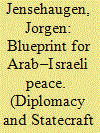

|
|
|
|
|
| Summary/Abstract |
After the 1973 Arab–Israeli war, the American Secretary of State, Henry Kissinger, conducted a series of negotiations between Israel and its Arab adversaries, culminating in three disengagement agreements. As successful as these were, by late 1975 Kissinger’s step-by-step approach had stagnated. New approaches seemed essential to push the peace process forward. Throughout 1975, a Brookings Institution study group wrote a report on how the United States could better approach Arab–Israeli peacemaking. It recommended a comprehensive approach, aimed at solving all outstanding questions, by including all the parties within the same framework. The recommendations advocated including the Soviet Union in the peace process and that the Palestinians should represent themselves. The report was highly influential on President Jimmy Carter’s subsequent approach towards the Arab–Israeli conflict—and many of the report’s authors staffed his Administration. Carter’s perceived adaptation of the report aggrieved the Israelis, whilst for others the Brookings report served as a normative benchmark for the Carter presidency.
|
|
|
|
|
|
|
|
|
|
|
|
|
|
|
|
| 3 |
ID:
134446
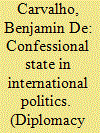

|
|
|
|
|
| Summary/Abstract |
Whilst religion and collective identity have become issues of central concern to international relations scholars, dynastic concerns and national interests still dominate their analyses of early modern international politics. This analysis contributes to the constructivist emphasis on collective identity to foreign policy by examining Tudor England in light of the concept of confessionalisation. Based on the recent historiography of Tudor England, this analysis demonstrates the importance of religion in defining not only the collective identity of international actors, but also their foreign policies, choice of alliances, and, more generally, their international outlook. Through such a lens, it seeks to draw analyses of the confessional state away from their focus on domestic state formation to the “external” dimension of confessionalisation and its importance for international politics.
|
|
|
|
|
|
|
|
|
|
|
|
|
|
|
|
| 4 |
ID:
134447
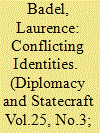

|
|
|
|
|
| Summary/Abstract |
The question of diplomatic identity has rarely seen study from a specifically historical perspective rooted in the long term. This analysis explores the role and self-perceptions of an unknown and, yet, central actor in the French economic diplomacy: the commercial counsellor. It offers new and stimulating ideas on the entangled links between State and the business sphere in France. The fundamental ambivalence of the commercial counsellor’s identity illuminates the atypical nature of French commercial diplomacy from 1918 to the 2000s. Through assimilation into the Ministry of Economy and in a Janus-like role facing both the Quai d’Orsay and French companies, French commercial counsellors have had to endure a complicated situation whilst remaining the Cinderella of the diplomatic sphere. Deploying an historical analysis to enrich the contemporary debate on the state of diplomacy, this study explores the impact of interventions by non-state actors at the heart of the diplomatic machinery. Far from being an innovation of the 1990s, this intervention was a recurring theme throughout the twentieth century, and its examination sheds new light on the persistence of the neo-corporatist practice of commercial diplomacy in France.
|
|
|
|
|
|
|
|
|
|
|
|
|
|
|
|
| 5 |
ID:
134448
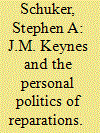

|
|
|
|
|
| Summary/Abstract |
Some observers still regard John Maynard Keynes’ polemic against the Treaty of Versailles as serious economic analysis. In fact, Keynes continued to play an unacknowledged partisan role in reparation diplomacy during the 1920s. He suggests in a memoir that he never saw the Hamburg banker Carl Melchior alone again after October 1919. Using German sources not exploited by Keynes’ principal biographers, this analysis shows that the intimate relationship continued. Melchior drew Keynes into the highest governing circles of the Reich. Keynes supported the 1922–1923 German hyper-inflation on political grounds and helped craft the German reparations note of June 1923.
|
|
|
|
|
|
|
|
|
|
|
|
|
|
|
|
| 6 |
ID:
134623
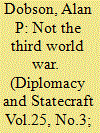

|
|
|
|
|
| Summary/Abstract |
Whilst the British and Americans expended blood and treasure together in the Kuwaiti desert in 1991, bureaucratic blood from both sides was also visible on carpets in London and Washington. The reason was attempts to replace the access to Heathrow airport of two failing airlines, Pan American World Airways and Trans World Airlines, with American and United Airlines. This succession rights affair was one of the most difficult diplomatic negotiations ever on civil aviation between the United States and Britain. How and why that controversy developed, its resolution, and what impact on, and feedback from, the broader Anglo–American relationship that it had are the main concerns of this analysis.
|
|
|
|
|
|
|
|
|
|
|
|
|
|
|
|
| 7 |
ID:
134581
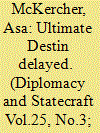

|
|
|
|
|
| Summary/Abstract |
Until Canada joined in 1990, the issue of its membership in the Organisation of American States bedevilled Canadian foreign policy, which many observers saw as a decisive test of Ottawa’s interest in Latin America. Under the Liberal government of Lester Pearson, prime minister from 1963 to 1968, and the stewardship of his secretary of state for External Affairs, Paul Martin, Canada seemed poised to join OAS. But a mixture of foreign and domestic factors—including American intervention in the Dominican Republic, Cuba’s isolation within the hemisphere, and growing Canadian nationalism—ruined this initiative. Using the Pearson government’s policy toward the OAS as a lens through which to explore the direction of Canadian foreign relations in the 1960s, this analysis also examines competing views of Canada’s place in the world.
|
|
|
|
|
|
|
|
|
|
|
|
|
|
|
|
|
|
|
|
|